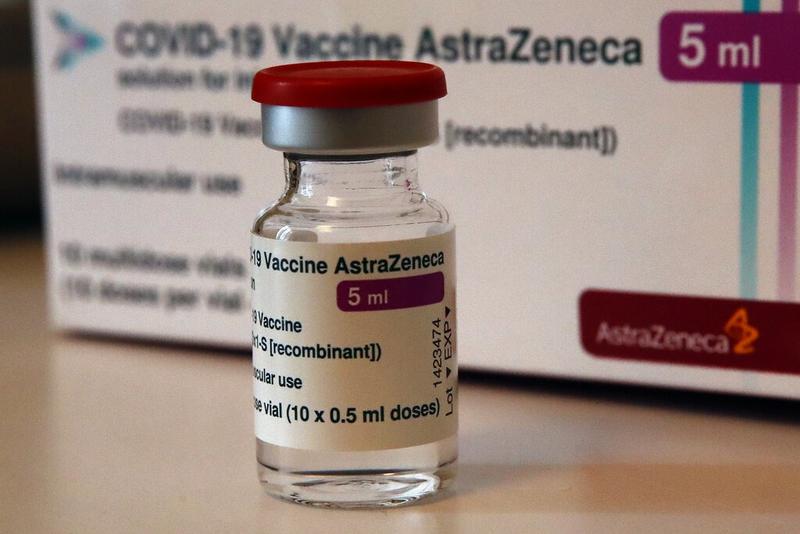 A vial of AstraZeneca's COVID-19 vaccine is pictured in a pharmacy in Boulogne Billancourt, outside Paris, France, March 15, 2021. (CHRISTOPHE ENA / AP)
A vial of AstraZeneca's COVID-19 vaccine is pictured in a pharmacy in Boulogne Billancourt, outside Paris, France, March 15, 2021. (CHRISTOPHE ENA / AP)
European health ministers are discussing the future of AstraZeneca Plc’s COVID-19 vaccine as they await fresh guidance from the region’s drug regulator in response to concerns about health risks.
The European Medicines Agency will hold a press conference on Tuesday afternoon, bringing forward a planned review by two days amid a fresh vaccine crisis. A growing number of countries have suspended use of Astra’s shot to examine side effects, potentially throwing the region’s already slow inoculation campaign further off track.
At stake is the future of one main building block of Europe’s vaccine push, where AstraZeneca was due to account for about a fifth of all doses in the second quarter
At stake is the future of one main building block of Europe’s vaccine push, where Astra was due to account for about a fifth of all doses in the second quarter.
The EU has received 14 million doses from the company so far, and could have taken in about 120 million doses in the next six months. Of the Astra doses delivered to the EU, almost 8 million have not been administered, or more than half. That compares with just 13 percent for the shot provided by Pfizer Inc. and BioNTech SE.
"We cannot afford a single doubt over the vaccines’ efficiency," French Industry Minister Agnes Pannier-Runacher said on France Info radio on Tuesday. The AstraZeneca CEO, Pascal Soriot, “is in the hot seat and he knows it”.
But the EMA reiterated Monday that the vaccine’s benefits still outweigh its risks. Some medicines that have been on sale for decades, such as contraceptive pills, have been proven to increase the risk of blood clots and are nonetheless still on the market.
ALSO READ: New coronavirus variant found in French region of Brittany
With infection numbers creeping up again in countries like Germany, the risk of further vaccine shortages will increase pressure on politicians who have been punished for a lackluster immunization program. German Chancellor Angela Merkel saw her party slump to its worst ever results in two state elections on Sunday. In France, President Emmanuel Macron is running neck and neck with his populist rival Marine Le Pen in polls for next year’s presidential election.

The European Commission has committed to immunizing 70 percent of adults by the end of September, but the latest precautions could push back efforts by at least a couple of weeks and potentially longer, according to London-based research firm Airfinity Ltd.
Such delays would come at a high price by keeping businesses under virus restrictions for longer. Italy has reintroduced harsher measures, and parts of Germany have also seen an increase in infections, prompting some medical experts to demand a tightening of the restrictions from which Europe’s largest economy was just starting to emerge.
“For each week that restrictions linger, we estimate the economic loss is roughly 3 percent of gross domestic product,” said Maeva Cousin, an economist at Bloomberg Economics. “That equates to nearly 17 billion euros for a two-week delay.”
Even before the suspension, the UK-based company’s shot, jointly developed with the University of Oxford, had grappled with production delays, which the company attributed in part to typical teething issues with a new product. As a result, Cambridge-based Astra will only be able to deliver about 100 million doses to the EU in the first half of the year, it said last week, about a third of the number originally planned.
Questions over the safety of the Astra shot have inserted an extra dose of bitterness into the bloc’s troubled relations with the UK government, which has been vaunting the vaccine as a vindication of British ingenuity.
READ MORE: AstraZeneca's EU vaccine woes deepen on clots, nationalism
The suspensions in the EU contrast with Astra’s positive run in the UK, where Prime Minister Boris Johnson is championing a rapid vaccination push and continues to deem the shot safe to use.
Astra’s vaccine is one of four that have been approved in the EU, alongside shots from Pfizer and BioNTech, Moderna Inc., and Johnson & Johnson. With supplies from J&J yet to arrive and doses of Moderna limited, that means the bulk of immunizations in many countries will now be conducted with Pfizer-BioNTech.
Responding to the suspensions, AstraZeneca said it’s working with national health authorities and European officials.
After Denmark became one of the first countries in the region to suspend the shot, the EMA said on March 11 that the number of clots in vaccinated people was no higher than the number seen in the general population - totaling 30 cases among 5 million people who had received the vaccine.
READ MORE: Thai PM gets first shot of AstraZeneca vaccine after safety scare


